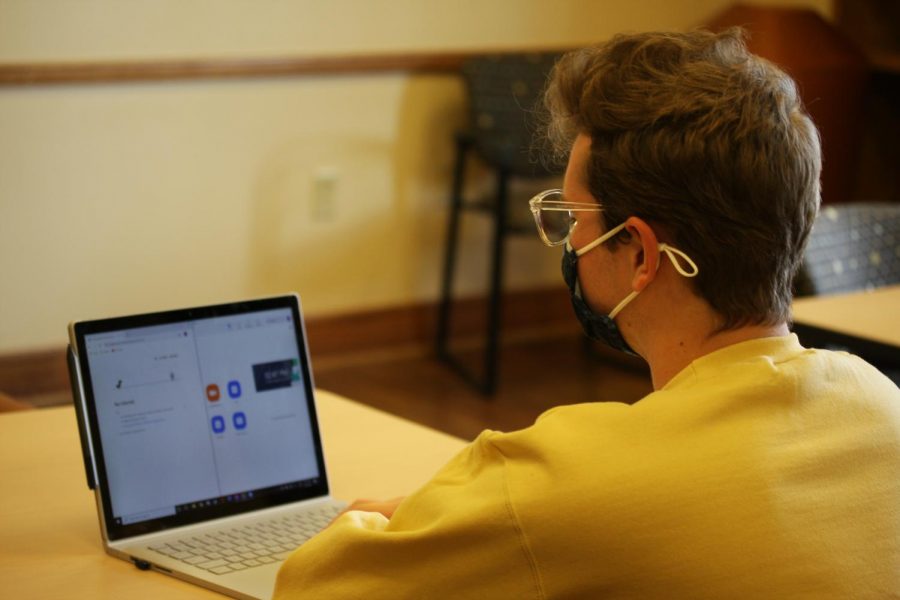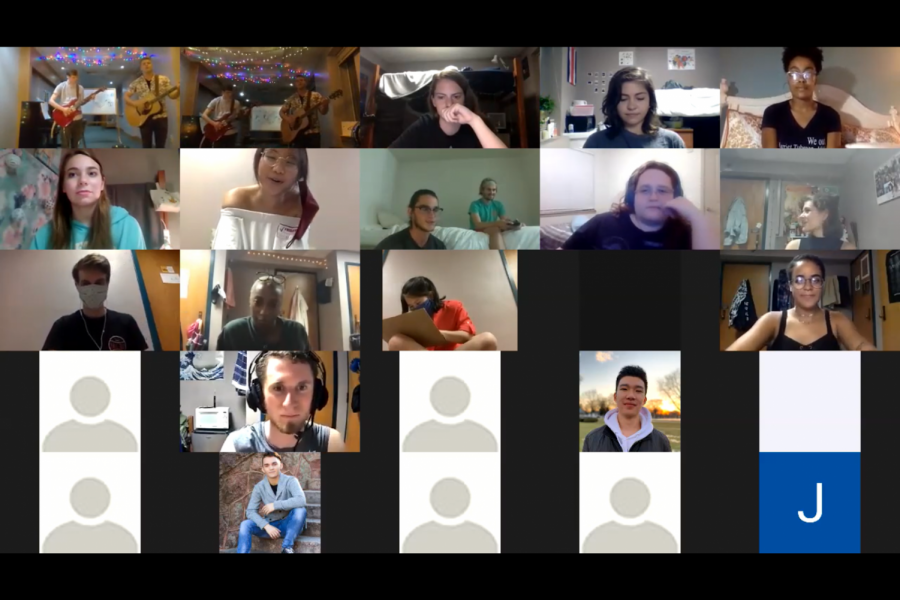In preparation for a hybrid class year, Vanderbilt University Information Technology (VUIT) trained and scaled up operations significantly. Despite that, the students and faculty have seen some outages and shortfalls.
Following the campus-wide 3-hour network outage on campus, VUIT said in an Oct. 3 email the outage was not due to any fault of the university, but an externally inflicted outage.
According to Julie Walker, Associate Director of Communications, Information Technology, people were unable to connect to the Internet because of a mistaken change to a top-level domain system made by another vendor that impacted the Internet Service Provider (ISP) utilized by Vanderbilt.
“The vendor’s change inadvertently halted connectivity of internet traffic to and from Vanderbilt campus. Once the issue was identified and rectified by that vendor, our ISP was able to route our traffic,” Walker said.
VUIT operations
According to Walker, VUIT optimizes its investments in servers by leveraging both physical and virtual systems to assure a “reliable, accessible, serviceable and secure environment.” She said that VUIT manages approximately one thousand servers.
“We use servers in the cloud to meet the burstable, compute needs of certain operations without having to invest in equipment that has excess capacity at ordinary times,” Walker said.
Walker said that VUIT has a staff of over 200 people, who collectively cover support roles 24/7. VUIT enhances the security of our systems and data in many ways, such as implementing multi-factor authentication on more and more applications.
“We are vigilant every day about preventing cybersecurity attacks on our systems; we prevent over a million attacks at VU every single day,” Walker said. “We see over 776,000 spam or phishing emails every day. We support and respond to all technology needs of faculty, staff, and”
VUIT has also made sure that they have a “tremendous amount” of cloud storage, per Walker. VUIT leverages cloud storage vendors such as Box.com, Google Drive and Microsoft’s OneDrive to user storage needs. Cloud storage from vendors like Software as a Service (SaaS) is also used by VUIT for Vanderbilt systems like AWS and Azure and the applications used through these vendors.
Walker also spoke about advancements in campus WiFi. She said that VUIT adds new access points where buildings are renovated and built, like in the Home Economics and Mayborn Buildings and the new Zeppos College in addition to the 4,700 WiFi access points that already exist on campus.
“We added, updated, and still continue to add many WiFi access points across campus—in both indoor and outdoor gathering spaces—to allow for students to work outside and connect to WiFi anywhere on campus,” Walker said. “We lifecycle access points every four to five years on a rotating basis, which means we lifecycle 20 percent to 25 percent, that is about 1,000 access points each year.”
When it comes to updates, Walker said that the server and application vendors constantly update their software to add features or fix known bugs. The date and times with the least impact are selected to implement these changes.
“The General Maintenance Window is on Sundays between midnight and 9 a.m.,” Walker said. “The regular updates/Patching of the Virtualization Environment is done on the 3rd Saturday of each month between 5 a.m. and 5 p.m. Microsoft Updates & Patching are made on Fridays from 10 p.m. to Saturdays at 8 a.m.”
VSG Resolution
In a resolution proposed by sophomore VSG Senator Joseph Humphries and sophomore Ashutosh Rai, the elected representatives of the Vanderbilt Student Body state that the current IT system has been prone to several issues like slow response times and outages. According to the statement, these stem from fixed-capacity servers which cannot expand during peak hours. Taking into consideration these issues as well as claiming a 30 percent budget improvement, VSG proposed using Bletchley, an IT company founded by current undergraduates.
“Bletchley had already been working on a system and negotiating with VUIT, but the CEO asked if I’d be willing to write a bill to gather student support in order to facilitate the process so that students may get the system more quickly. I thought it was a great idea after hearing the CEO’s explanation of the system and how it would prevent crashes and slow response times while using Vanderbilt’s online services,” Humphries said in a message to The Hustler.
VSG Speaker of the Senate Kate Petosa said in a message to The Hustler the resolution failed to pass in the last Senate session.
“‘Additionally, I simply felt voicing support for this was in the best interest of all students, so I did what I thought to be right in my position as Senator. However, other Senators disagreed and voted the bill down. It happens, but I’m glad we got a thorough discussion out of it, and I appreciate the perspective of the other Senators,” Humphries said.
Students and faculty
Eeshan Hasani, a Ph.D. student and T.A. of PSY 3705-01 said that VUIT responds relatively quickly to his requests, but the problems aren’t always solved.
“Zoom keeps dropping people out; I have had students email me that they were kicked out of class, and that’s obviously embarrassing, but that’s totally out of my control,” Hasani said. “When I reached out to VUIT, they just told me to let us know when it happens again, and when it didn’t happen for the next 2 days, they closed our ticket. Connection problems still exist a little bit here and there.”
He also speaks about how the class’s decision to not use so much software has helped avoid problems.
“I’m just happy that my course has a method that works,” Hasani said. “In another NSC 2201 course, when they had the first test, the Lockdown Browser kept crashing for many students. I think another class, Gen Psych, has had a lot of problems with tech as they are using a more tech-heavy approach. They have pre-recorded lectures, Launchpad, Tophat, Proctorio and all these softwares.”
Ellie Dessart, a remote first-year student, brings up the privacy issues in one of her classes’ methods of testing as a consequence of everything being online.
“The testing for certain classes like Gen Psych where you have Proctorio is concerning,” Dessert said. “I understand that they need to make sure that you’re not plagiarizing, but for me, I get very anxious when there’s a camera watching me, just for privacy issues. Giving the site all these permissions to look at my files makes me anxious.”
Hasani also highlights that while Brightspace, another platform, has been quite slower than usual, it isn’t the most responsive software anyway. He emphasized that Proctoria needs a very stable internet connection, and that is not always possible with so many students using the campus WiFi.
“From an instructor’s perspective, it’s hard to decide what pros and cons they are ready to trade-off,” Hasani said.
Walker stated that VUIT worked from late spring through summer to equip classrooms with the capabilities to teach remote and in-person classes simultaneously. They also trained faculty on the technology in these classrooms.
Hasani said he thinks that while VUIT and the Center for Teaching trained the instructors, they could have provided more training and resources to the TAs, as a lot of the TAs handle the technological end of the courses.
“I suppose they could always train their TAs more. But as a grad student, that would mean extra work, and we have other responsibilities,” Hasani said. “Maybe VUIT can help out with advanced technical management like editing videos or something.”
WiFi stability has been an issue with students, per Hasani.
“In my lab, vuNet keeps going off, but vuGuest works,” Hasani said. “I’ve had issues; it was out for an hour some time ago. It was quite annoying.”
To that, Walker said that VUIT strives to have fast, reliable WiFi, and if students have problems, to reach out to VUIT and get them sorted out.
Being remote, Dessart said she hasn’t had issues with WiFi except for minor freezes in the middle of Zoom classes. She said that while her WiFi has been good for the most part, she recognizes that a lot of people who don’t have access to stable WiFi could find this situation very challenging.
“Even my small problems with spotty WiFi has been stressful enough, but to imagine someone constantly worrying about getting kicked off of class or not having the accommodations, that’s just another level,” Dessart said
While Hasani said he misses in-person classes, he understands the necessity of online classes due to the pandemic and VUIT’s role in making that happen.
“It could be better, but I’m on the whole happy with how VUIT is doing,” Hasani said.






